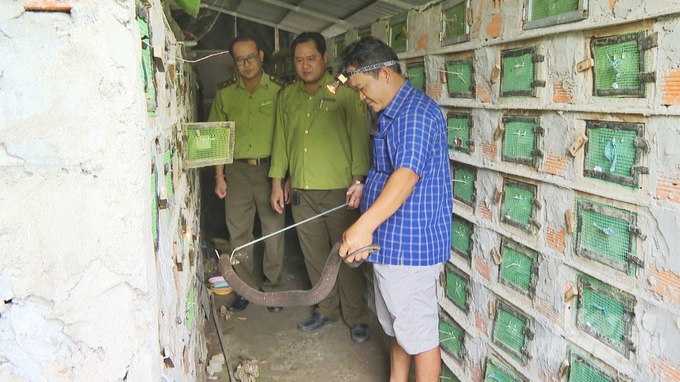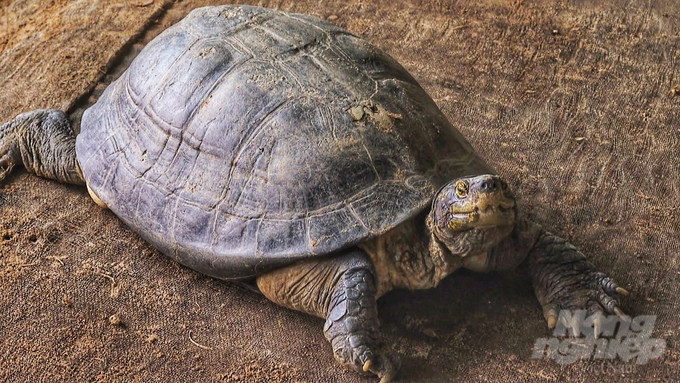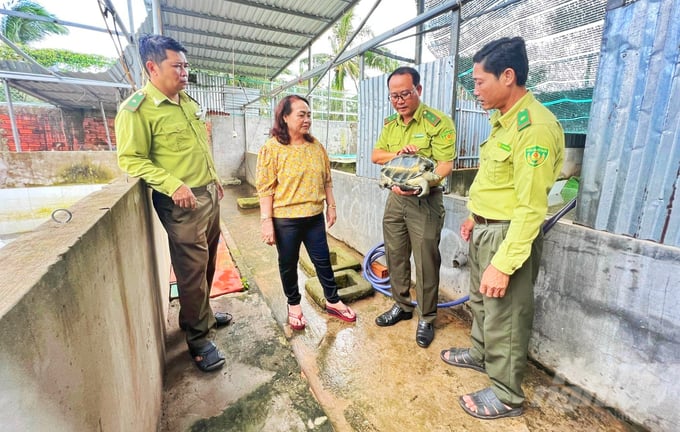May 26, 2025 | 20:19 GMT +7
May 26, 2025 | 20:19 GMT +7
Hotline: 0913.378.918
May 26, 2025 | 20:19 GMT +7
Hotline: 0913.378.918
The concept of commercial forest and wildlife farming has grown significantly in Soc Trang province over the last 2-3 years owing to the attractive profit potential, which ranges from tens to hundreds of millions of dong each year.

Soc Trang Province Forest Protection Department, the province now has 265 registered forest and wildlife agricultural companies, employing about 49,400 people. Photo: Kim Anh.
According to figures from the Soc Trang Province Forest Protection Department, the province now has 265 registered forest and wildlife agricultural companies, employing about 49,400 people. Approximately 185 enterprises cultivate species such as snakes, asiatic softshell turtles, pangolins, civets, bamboo rats, and hybrid wild boars, with annual profits ranging from 30 to 300 million VND depending on the number of animals.
Mr. Tran Van Tinh invests in breeding enclosures for yellow-headed temple turtles rather than profiting on the seaside economy, as many other families in Cang Ap, Tran De town, and Tran De district do.
The criteria for yellow-headed temple turtle cages and living habitats are not too severe, resulting in low death rates. Yellow-headed temple turtles grown for 2-3 years reach marketable size. According to Mr. Tinh, the predominant demand for this species comes from big restaurants, resulting in quite expensive pricing ranging from 350,000 to 400,000 VND per kilogram. In addition to meat sales, Mr. Tinh's farm is a reliable supply of juvenile yellow-headed temple turtles for other interested breeders.
Yellow-headed temple turtles are on the endangered and uncommon species list for forest wildlife and flora. As a result, farms must follow the criteria established by the provincial Forest Protection Department for registration and issuing identification numbers, as well as keeping detailed records of arriving and exiting items. Furthermore, farms must closely adhere to environmental sanitation processes, enclosure cleanliness, and animal husbandry skills in order to achieve steady development.
Tran Minh Lanh's enterprise at Phuong Hoa 1 hamlet, Hung Phu commune, My Tu district, was formerly recognized as a provincial-scale snake farm. In recent years, the farm has grown to incorporate pangolin farming, which now spans three hectares and includes breeding ponds for both breeding and commercial Asian softshell turtles.
Overall, caring for Asian softshell turtles is not very different from caring for snakes, hence Mr. Lanh's methodology rapidly provides strong economic returns. In addition to local consumption, commercial pangolins from the farm are often provided to restaurants in adjacent provinces and towns.
Mr. Lanh's family has had a consistent source of income for many years, with breeding asiatic softshell turtles selling for 350,000 dong each individual and commercial turtles fetching up to 2 million dong per kilogram.

Wildlife farming facilities have been guided through the procedures and regulations for registering establishment codes and maintaining necessary import and export records.
These models demonstrate that forest and wildlife farming provides economic advantages to communities. However, the majority of these approaches need large initial investment cash. When market demand peaks or goods run out of outlets, the animals may become a burden for breeders. As a result, regulating and managing wildlife farming is critical to preventing issues throughout the farming process.
Since the beginning of the year, the Soc Trang Province Forest Protection Department has conducted 29 inspections of forest and wildlife farming facilities, as well as guiding breeders through the procedures and regulations for registering establishment codes and maintaining necessary import and export records.

This technique enables the forest protection industry to quickly detect flaws and gaps in wildlife farming operations, allowing for stricter oversight and giving breeders with recommendations to improve regulatory compliance. Photo: Kim Anh.
According to Mr. Nguyen Thanh Tu of the Soc Trang Province Forest Protection Department's Mobile Forest Inspection and Fire Prevention and Fighting Team, surprise inspections are undertaken in addition to normal quarterly inspections. This technique enables the forest protection industry to quickly detect flaws and gaps in wildlife farming operations, allowing for stricter oversight and giving breeders with recommendations to improve regulatory compliance.
Furthermore, local forest protection authorities recommend that individuals properly study administrative restrictions, technological elements, and product market outlets before developing wildlife farming models. Never acquire, sell, use, consume, exhibit, or advertise wild animal specimens without first establishing their legal origin.
Translated by Linh Linh

(VAN) The mutual export of agrifood products between the European Union (EU) and the United Kingdom (UK) must occur again without certification, border controls or other red tape. This was agreed at the UK-EU summit.
/2025/05/22/5121-2-173645_677.jpg)
(VAN) NBSAP Tracker identifies strengths and areas for improvement in the National Biodiversity Strategy, based on each region’s priorities and capacities.

(VAN) The draft amendment to the Circular on rice export trading stipulates a periodic reporting regime for rice exporting enterprises.

(VAN) Dong Thap farmers attained an average profit margin of 64% during the summer-autumn 2024 crop (first season), while An Giang and Kien Giang farmers followed with 56% and 54%, respectively.

(VAN) As a doctoral student doing research on renewable energy and electrification at Harvard University, the author shares his musings on electricity, nature, and countryside memories.

(VAN) The decree on Extended Producer Responsibility (EPR) ensures transparent management and disbursement of support funds, avoiding the creation of a “give-and-take” mechanism.

(VAN) Hue City rigorously enforces regulations regarding marine fishing and resource exploitation, with a particular emphasis on the monitoring of fishing vessels to prevent illegal, unreported, and unregulated (IUU) fishing.